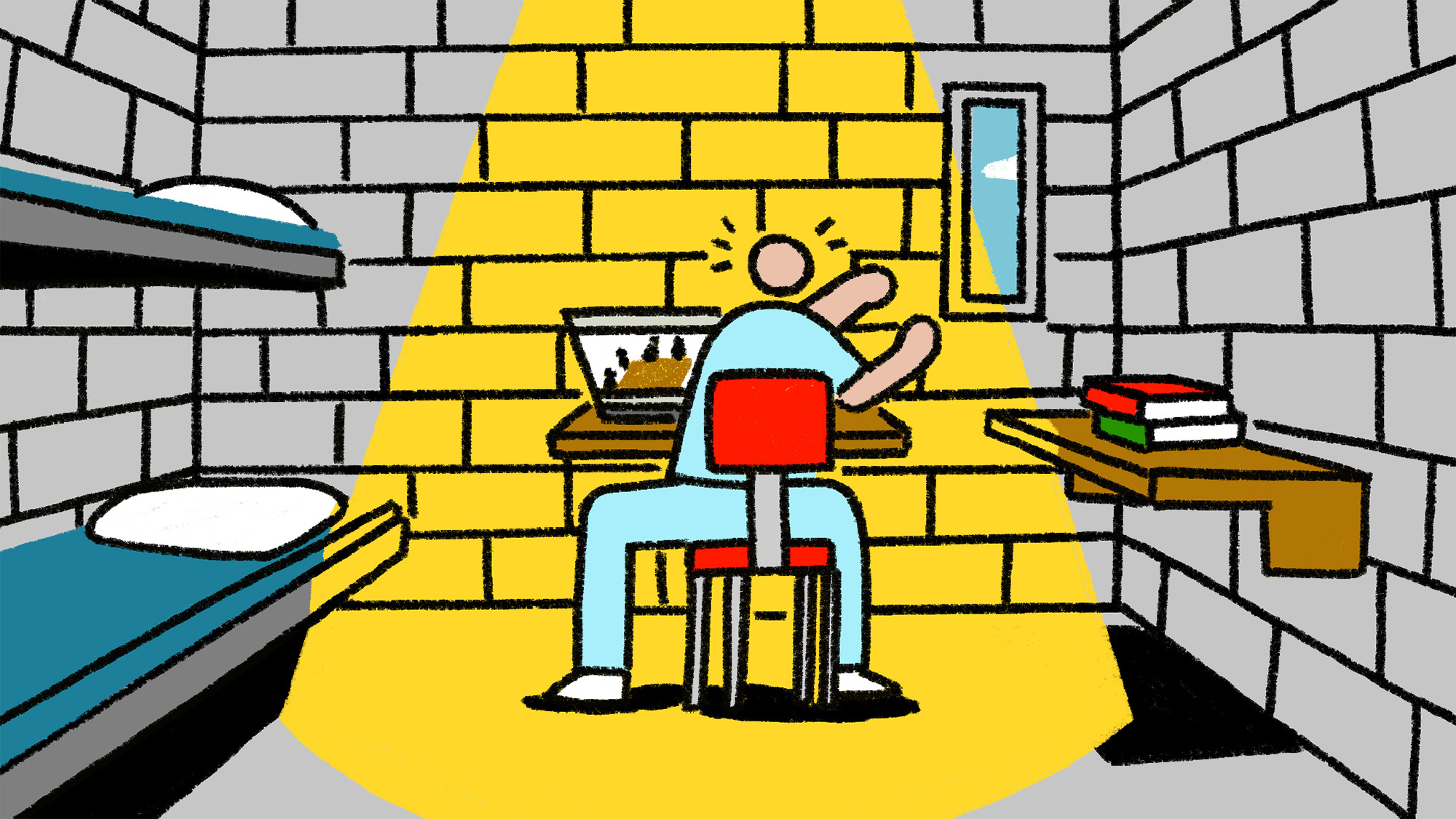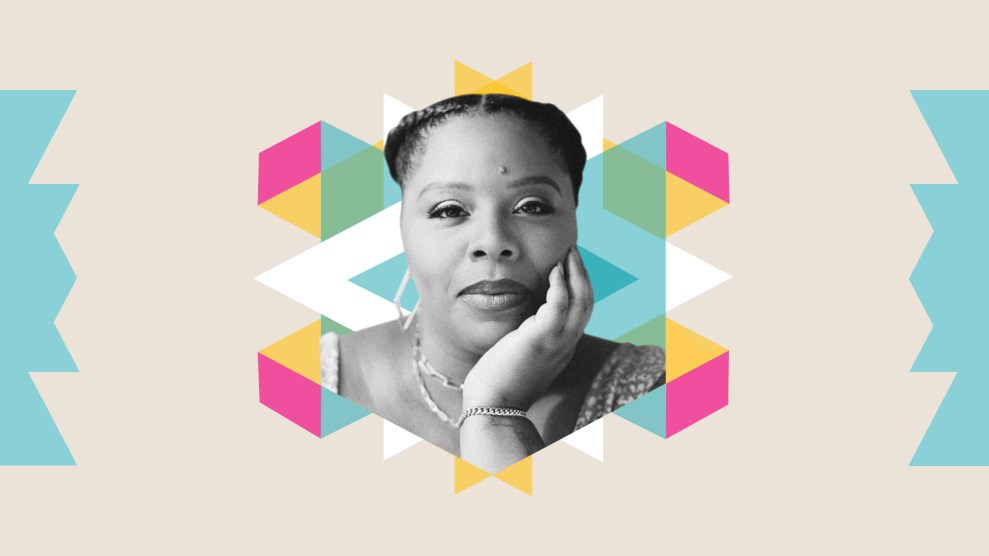In his 6.5-by-14-foot cell, Leo Hylton keeps an unopened cherry-flavored Hint seltzer. Since March 2022, he’s held on to the bottle as a prized possession, a “touchstone” that he says helps remind him of “the visceral feel” of the first day he spent outside the Maine State Prison in 12 years.
Hylton left for work. He’s a co-instructor with Colby College’s anthropology department. Alongside tenured professor Catherine Besteman, this spring for the second year running, he’ll teach via Zoom from inside the walls about abolition—the movement to end incarceration. According to a number of experts in prison education, Hylton is the first professor of his kind in the United States.
Last March, the prison approved an unprecedented chance for Hylton to meet his students in person on their campus. He left under armed guard, wearing a freshly pressed blue button-down shirt and jeans—and handcuffs, belly chains, and hobbles that would clamp his legs if he tried to run.
“I’m going through this whole process of putting these restraints on, cheesing ear to ear,” he remembers. Headed to Colby, he says, “I don’t think I had felt more free in my life.” In the classroom, Hylton—a large 32-year-old at 6.5 feet and 275 pounds, with a calming deep voice and a contagious laugh—and Besteman began, as they usually do, by instructing everyone to make a circle with their desks. Only this time, Hylton could hear chairs being dragged. As he saw his students speak, he registered their voices and their position in the room. The escort officers joined in, following instructions from their charge—not the other way around—moving furniture and taking part in the conversation he would lead.
This was all possible because Hylton has long-standing relationships with prison officials and staff, including Randall Liberty, who, as sheriff of Kennebec County, arrested Hylton 14 years ago. Now Maine’s commissioner of corrections, he helped clear the way for Hylton’s job at Colby despite countless policy hurdles. Liberty, Hylton wrote over email, “has seen me at my worst and is now supporting me in the realization of my best.”
Hylton had an abusive father, and, at age 10, cold-called a social worker who ushered him into Maine’s foster care system. When a family of Canadian nationals he had bonded with and hoped would adopt him failed to acquire citizenship, “that was it,” he remembers. “It was just one separation too many.” Soon after, Hylton was diagnosed with emotional detachment disorder and oppositional defiant disorder. “I did not have the capacity, the ability, or the language to be able to wrestle with all the emotion,” he says, and his teen years were rife with disconnection and isolation. When he was 16, his latest foster mother had a fatal heart attack while he was on the line with 911. A year later, his biological father died of cancer. At 17, Hylton moved from the coastal town of Belfast to Augusta. Within a month, Hylton participated in a violent home invasion alongside an older foster brother, wielding a machete against a man and his 10-year-old daughter.
In county jail for 22 months, Hylton was placed in segregation, or “seg”—a version of solitary confinement—as his lawyer negotiated a plea deal. Hylton began taking classes, and in 2010, on the day he was sentenced to 50 years behind bars, received his GED.
Once inside, Hylton says he leaned into “the hustle,” getting into fights and gaining “the reputation of someone unafraid of violence.” But that reputation, alongside his trajectory, began to shift radically when he met Ephriam “E” Bennett, who was serving a 27-year sentence.
Bennett, a former prizefighter, career military man, and entrepreneur, was almost 30 years older than Hylton and saw potential in him. As an early act of mentorship, one day he dropped a stack of magazines in front of Hylton in the rec yard. “Here,” Bennett said, “have something to read.” From there, Bennett pushed him to take more courses and enroll in programs for music and creative writing. Hylton eventually got a bachelor’s degree from the University of Maine, and, just last year, earned a master’s in conflict analysis, with a concentration in social justice advocacy and activism from George Mason University.
Bennett also introduced Hylton to a Christian faith defined by, as Hylton puts it, “the Jesus of the Bible” with whom he could relate: “the callous-handed, darker-skinned, rough around the edges…Jesus, not the blond-haired, blue-eyed European Jesus.” Hylton was accepted into the prison’s internal hospice program, which aids people who are dying while incarcerated. He has since helped 17 men at the end of their lives, giving baths and keeping them company with stories and songs.
Hylton soon gained respect from fellow residents, staff, and administrators. When prison officials, in step with reformers pushing a reconsideration of solitary confinement, decided to close down the Maine State Prison’s own seg ward, Hylton and a handful of fellow residents helped reenvision the space, and then worked together to remodel the cells where he had spent some of his earliest days in prison. Today it is a unit people earn their way into, with a sizable garden that grows food for both the prison’s kitchen and outside donation, a library and study rooms, a prison dog grooming facility, and a gym. Besteman, who has taught at Colby for nearly three decades, says Hylton is “fundamental to the reason why that prison is no longer as violent.”
Although Hylton is barred from making direct contact with the people he harmed, he has submitted a letter of apology for them to the state; further contact is their choice. He says he subscribes to a philosophy of restorative justice, the idea that rehabilitation happens not through serving time, but by repairing the harm one has caused. He sees his work at Colby, and as a writer, as steps to that end. Aside from running a weekly abolitionist-themed email newsletter, he’s contributed around 30 columns to Mainer magazine, and published an autobiographical article about trauma and faith-based healing in the journal Religions. To Hylton, allowing people like him to teach “creates a means for us to…pay our debt to society.”
“I am able to contribute to my community,” Hylton says. “And that is one of the deepest, most transformative pieces of this teaching experience.”
Besteman first met Hylton in the fall of 2021 while running a statewide arts and education project on ending incarceration. Hylton participated in several related programs, including by helping to gather peers at the prison to participate in a short film on abolition. Finding him to be a “fulcrum between the inside and outside,” she arranged for him to speak at a Colby human rights lecture series held on Zoom during the pandemic. Afterward, Besteman put in a request to Colby’s provost to let Hylton join her as a co-instructor. “I knew he would be a powerful teacher,” she said, “extremely compelling and deeply interested in people.”
Their time together offers the barest glimpse of an abolitionist future, when the punishment and separation underlying incarceration are supplanted by programs rooted in community building. A typical class has Hylton teleconferencing on a projected screen while Besteman and 14 students gather in person. They begin by all answering the same question, either simple (“If you were weather right now, what would you be?’’) or more challenging (“What are you leaving behind to come into class today?”). Students then collectively reflect on weekly readings covering police, prisons, surveillance, the United States’ history of slavery and incarceration centers, and, ultimately, alternatives to such systems.
“It’s one thing to just read an article about solitary confinement,” says Halle Carroll, a Colby senior who took the class. “It’s another thing to finish reading and hear Leo talk about his experience and the experience of others.”
A month after he journeyed to Colby, all 14 of his students visited Hylton on the prison grounds. After giving them a tour of the facility, Hylton—unchained and free to hug them, unlike when he visited them on campus—took everyone to what he calls “his spot”: the only hill that lets you see beyond the fence to take in the mountains. “We all stood there,” Carroll recalls, “and shared a word to describe what this day meant to us.” At 4:30 p.m., Carroll and her classmates filed out of the prison’s gates to head back to campus. Hylton stayed inside.















